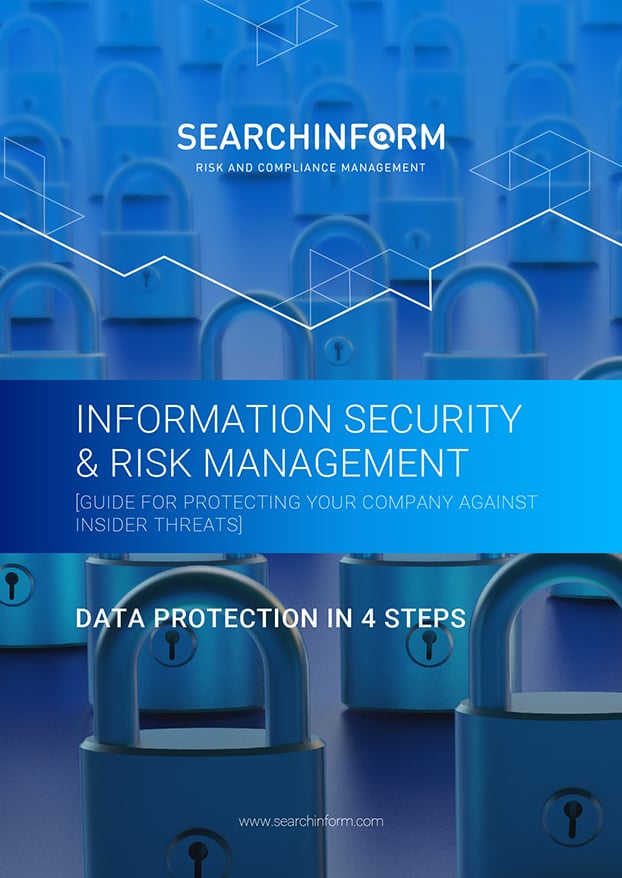Data Subject Access
Requests (DSAR):
Comprehensive Guide
- What Is a DSAR?
- Overview of DSARs Under GDPR, CCPA, and Other Legal Acts
- GDPR (General Data Protection Regulation)
- CCPA (California Consumer Privacy Act)
- Other Legal Acts
- DSAR Process
- Initiating a DSAR
- Timeframes and Deadlines
- Verification and Authentication
- Processing the DSAR
- Response to the DSAR
- Review and Appeals
- Record-Keeping and Documentation
- Exemptions and Limitations
- Handling DSAR Requests
- Data Collection and Retrieval
- Data Security Measures
- Communication with Data Subjects
- Response to DSAR
- Data Retention and Disposal
- Documentation and Record-Keeping
- DSAR Compliance
- Consequences of Non-Compliance
- Benefits of SearchInform Solutions in Handling DSARs
What Is a DSAR?
A DSAR, or Data Subject Access Request, is a legal right granted to individuals under various data protection regulations, including the General Data Protection Regulation (GDPR) in the European Union and the California Consumer Privacy Act (CCPA) in the United States. DSARs allow individuals to request access to personal data that organizations hold about them.
Overview of DSARs Under GDPR, CCPA, and Other Legal Acts
GDPR (General Data Protection Regulation)
Legal Basis: Under GDPR, DSARs are governed by Articles 15-22. Article 15 specifically outlines the right of access by the data subject.
Rights of Data Subjects: Data subjects have the right to obtain confirmation from the data controller as to whether or not personal data concerning them is being processed, and if so, access to that personal data. They also have the right to be informed about the processing of their personal data, including the purposes of the processing, the categories of personal data concerned, and the recipients or categories of recipients to whom the personal data have been or will be disclosed.
CCPA (California Consumer Privacy Act)
Legal Basis: The CCPA grants California residents certain rights regarding their personal information, including the right to request information about the personal data a business collects about them.
Rights of Data Subjects: Under the CCPA, data subjects have the right to request access to their personal information that a business collects, uses, and shares. They can request disclosure of specific pieces of information collected about them, categories of personal information collected, sources from which personal information is collected, purposes for collecting or selling personal information, and categories of third parties with whom the business shares personal information.
Other Legal Acts
Other legal acts in various jurisdictions may also grant similar rights to data subjects, allowing them to request access to their personal data held by organizations operating in those jurisdictions. These rights are often aimed at empowering individuals to have more control over their personal information and to ensure transparency and accountability from organizations processing their data.
In summary, DSARs provide individuals with the right to access their personal data held by organizations, as mandated by data protection regulations such as GDPR, CCPA, and other applicable laws.
DSAR Process
The DSAR (Data Subject Access Request) process involves several steps to ensure that data subjects can effectively exercise their rights to access their personal data while also protecting the security and privacy of that data. Below is an overview of the DSAR process:
Initiating a DSAR
Data subjects initiate a DSAR by submitting a request to the organization that holds their personal data. This request can often be made through various channels, such as email, an online portal, or in writing.
Timeframes and Deadlines
Under GDPR, organizations are generally required to respond to DSARs without undue delay and within one month of receiving the request. However, this period can be extended by two further months for complex requests, and the data subject must be informed of any such extension and the reasons for it within one month of the receipt of the request.
The CCPA requires businesses to respond to DSARs within 45 days of receiving a verifiable request, with the possibility of a 45-day extension under certain circumstances.
Verification and Authentication
Organizations must verify the identity of the individual making the DSAR to prevent unauthorized access to personal data. Verification typically involves requesting additional information or documentation to confirm the identity of the data subject. However, organizations should balance the need for verification with the principle of minimizing data collection. They should not request excessive or unnecessary information for verification purposes.
Processing the DSAR
Once the DSAR is initiated and the data subject's identity is verified, the organization begins the process of gathering the requested personal data. This may involve searching various data sources and systems where the personal data is stored. Organizations must ensure that they provide the data subject with a copy of their personal data in a commonly used electronic format unless the data subject requests a different format or it is not technically feasible to provide it in the requested format.
Response to the DSAR
After collecting the requested personal data, the organization provides a response to the data subject. This response typically includes the requested personal data along with any relevant supplementary information, such as the purposes of processing, the categories of personal data processed, and any recipients of the personal data. If the organization decides not to fulfill the DSAR in whole or in part, they must provide the data subject with an explanation for the refusal.
Review and Appeals
Data subjects have the right to review the information provided in response to their DSAR and to challenge any inaccuracies or incompleteness in the data. In case of dissatisfaction with the response or handling of the DSAR, data subjects may have the right to appeal to the relevant data protection authority or pursue legal remedies.
Record-Keeping and Documentation
Organizations should maintain records of DSARs and their responses to demonstrate compliance with data protection regulations. Documentation should include details such as the date of the request, steps taken for verification, information provided, any extensions granted, and reasons for denying a request if applicable.
Exemptions and Limitations
Some jurisdictions and data protection regulations provide exemptions or limitations to DSARs. For example, certain types of information may be excluded from the scope of the request, such as legal professional privilege or trade secrets. Organizations should be aware of these exemptions and communicate them transparently to the data subject if applicable.
Overall, the DSAR process is designed to facilitate data subjects' rights to access their personal data while ensuring compliance with data protection regulations and safeguarding the security and privacy of personal data.
Handling DSAR Requests
Handling DSAR (Data Subject Access Request) requests involves several critical components to ensure compliance with data protection regulations and to protect the privacy and rights of data subjects. Below are important aspects of the DSAR handling process:

Data Collection and Retrieval
When a company gets a DSAR, they need to quickly find and gather all the personal information related to the person making the request. This means they might have to check different places like databases, emails, and backups where this information is kept. It's important to search carefully to make sure they collect everything the person asked for, even if some of it is held by other companies they work with.
Data Security Measures
To keep personal data safe while dealing with DSARs, companies need to put strong security measures in place. They should make sure only authorized people can access the data by setting up access controls. It's also important to use encryption, pseudonymization, and anonymization techniques to protect the data's confidentiality and integrity. When sharing personal data with the people who requested it or their representatives, it's crucial to use secure transfer methods to prevent unauthorized access.
Communication with Data Subjects
It's really important for companies to be open and clear when they're dealing with DSARs. They should let people know they've received their request as soon as possible and give them an idea of when they can expect a response. If they need more info to handle the request, they should reach out to the person making the request quickly to get what they need. And it's a good idea to keep the person updated on how things are going, especially if there are any delays or if they need more time to sort things out.
Response to DSAR
When companies respond to DSARs, they need to make sure they cover everything the person asked for, following the rules of data protection laws. They should present the personal data in an easy-to-understand way, making sure to explain any tricky terms or abbreviations so it's clear. If they can't give out some information because of legal reasons, they should explain why they can't share it, being upfront about any exemptions or limitations.
Data Retention and Disposal
Companies need to check their rules about keeping data to decide how long they should hold onto personal information they got from DSARs. After they're done with the DSAR process, any personal data they don't need anymore should be safely thrown away, following the rules laid out in data protection laws.
Documentation and Record-Keeping
Businesses should review their data retention policies to determine the appropriate duration for retaining personal information obtained from DSARs. Once the DSAR process is concluded, any personal data that is no longer required should be securely disposed of, adhering to the guidelines outlined in data protection laws.
By addressing these important components, organizations can effectively handle DSAR requests while upholding data protection principles and respecting the rights of data subjects.
DSAR Compliance
Ensuring compliance with DSARs involves meeting various regulatory requirements and maintaining thorough documentation and record-keeping practices. Firstly, businesses must adhere to the specific regulations governing data subject access requests, such as GDPR or CCPA, which outline the rights of individuals to access their personal data. This entails understanding the legal obligations imposed by these regulations, including timeframes for responding to DSARs and any exemptions or limitations that may apply.
Documentation and record-keeping are crucial aspects of DSAR compliance. Companies must maintain detailed records of DSARs received, including the date of the request, the information requested, steps taken to verify the requestor's identity, and the organization's response. These records serve as evidence of compliance in the event of regulatory audits or inquiries and help demonstrate that the organization has fulfilled its obligations regarding DSARs.
Additionally, businesses must ensure that their DSAR processes align with other regulatory requirements, such as data security and confidentiality obligations. This involves implementing appropriate security measures to protect the personal data during the handling process, such as encryption, access controls, and secure transfer protocols. Companies should also consider any additional requirements imposed by industry-specific regulations or internal policies related to DSARs.
Overall, DSAR compliance requires a comprehensive approach that encompasses legal, procedural, and technical considerations. By understanding and meeting regulatory requirements, maintaining thorough documentation, and implementing robust data protection measures, organizations can effectively manage DSARs while upholding the rights of data subjects and ensuring compliance with applicable laws.
Consequences of Non-Compliance
Non-compliance with DSAR regulations can result in various consequences for organizations, including legal penalties, reputational damage, and loss of trust from customers and stakeholders. Firstly, regulatory authorities have the power to impose significant fines and sanctions on businesses found to be in violation of data protection laws. For instance, under GDPR, fines can amount to up to €20 million or 4% of global annual turnover, whichever is higher.
Furthermore, non-compliance may lead to legal action initiated by affected individuals or data subjects. This can result in costly litigation, settlements, and damages awarded to the plaintiffs. Additionally, regulatory investigations and audits may be triggered by complaints or breaches reported to authorities, further exposing organizations to scrutiny and potential penalties.
Beyond financial implications, non-compliance can have severe reputational consequences. Negative publicity surrounding data breaches or mishandling of DSARs can damage a company's brand image and erode customer trust. This can lead to customer attrition, loss of business opportunities, and difficulty attracting new customers or partners.
Moreover, non-compliance with DSAR regulations may hinder organizations' ability to conduct business in certain markets or industries. Regulatory authorities may impose restrictions or sanctions on non-compliant entities, limiting their operations or access to certain data.
In summary, the consequences of non-compliance with DSAR regulations extend beyond financial penalties to encompass legal, reputational, and operational risks. Organizations must prioritize compliance efforts to mitigate these risks and uphold the rights of data subjects while maintaining trust and integrity in their operations.
Benefits of SearchInform Solutions in Handling DSARs
SearchInform solutions offer several benefits for organizations handling Data Subject Access Requests (DSARs) effectively:
Efficient Data Retrieval: SearchInform solutions facilitate quick and comprehensive data retrieval, enabling organizations to locate and access personal data requested in DSARs efficiently. Advanced search capabilities and indexing algorithms allow for quick identification of relevant data across various data sources, including emails, documents, databases, and archives.
Enhanced Data Security: By implementing robust security measures such as access controls, encryption, and activity monitoring, SearchInform solutions help organizations maintain the security and integrity of personal data during the DSAR handling process. This ensures that sensitive information is protected from unauthorized access or data leakages.
Compliance with Regulatory Requirements: SearchInform solutions assist organizations in complying with data protection regulations such as GDPR and CCPA by providing features such as data discovery, classification, and audit trails. These functionalities enable organizations to demonstrate transparency, accountability, and compliance with regulatory requirements when responding to DSARs.
Streamlined DSAR Workflow: With SearchInform solutions, organizations can streamline the DSAR workflow by automating repetitive tasks, such as data retrieval, redaction, and response generation. This not only saves time and resources but also ensures consistency and accuracy in DSAR handling processes.
Centralized Data Management: SearchInform solutions offer centralized data management capabilities, allowing organizations to consolidate and manage personal data from disparate sources in a unified platform. This centralized approach simplifies DSAR handling by providing a single point of access for retrieving, reviewing, and responding to requested data.
Audit and Reporting Features: SearchInform solutions include audit and reporting features that enable organizations to track and monitor DSAR activities, including requests received, responses provided, and compliance status. These features facilitate accountability and transparency in DSAR handling processes and help organizations identify areas for improvement.
Overall, SearchInform solutions provide organizations with the tools and capabilities needed to effectively manage DSARs, ensuring compliance with regulatory requirements, protecting data security, and streamlining DSAR workflows.
Ready to elevate your data management, security, and DSAR handling? Experience the power of SearchInform solutions firsthand! Discover the efficiency, security, and compliance benefits by taking a hands-on approach. Try our solutions today to see how they can streamline your DSAR processes, enhance data security, and provide valuable insights into your organization's information landscape.
Don't miss out on the opportunity to transform the way you handle data – embark on a trial and witness effective features of SearchInform solutions for yourself. Your data deserves the best protection and management – take the first step towards a more secure and streamlined future!
Full-featured software with no restrictions
on users or functionality
Company news
SearchInform uses four types of cookies as described below. You can decide which categories of cookies you wish to accept to improve your experience on our website. To learn more about the cookies we use on our site, please read our Cookie Policy.
Necessary Cookies
Always active. These cookies are essential to our website working effectively.
Cookies does not collect personal information. You can disable the cookie files
record
on the Internet Settings tab in your browser.
Functional Cookies
These cookies allow SearchInform to provide enhanced functionality and personalization, such as remembering the language you choose to interact with the website.
Performance Cookies
These cookies enable SearchInform to understand what information is the most valuable to you, so we can improve our services and website.
Third-party Cookies
These cookies are created by other resources to allow our website to embed content from other websites, for example, images, ads, and text.
Please enable Functional Cookies
You have disabled the Functional Cookies.
To complete the form and get in touch with us, you need to enable Functional Cookies.
Otherwise the form cannot be sent to us.

Subscribe to our newsletter and receive a bright and useful tutorial Explaining Information Security in 4 steps!

Subscribe to our newsletter and receive case studies in comics!







